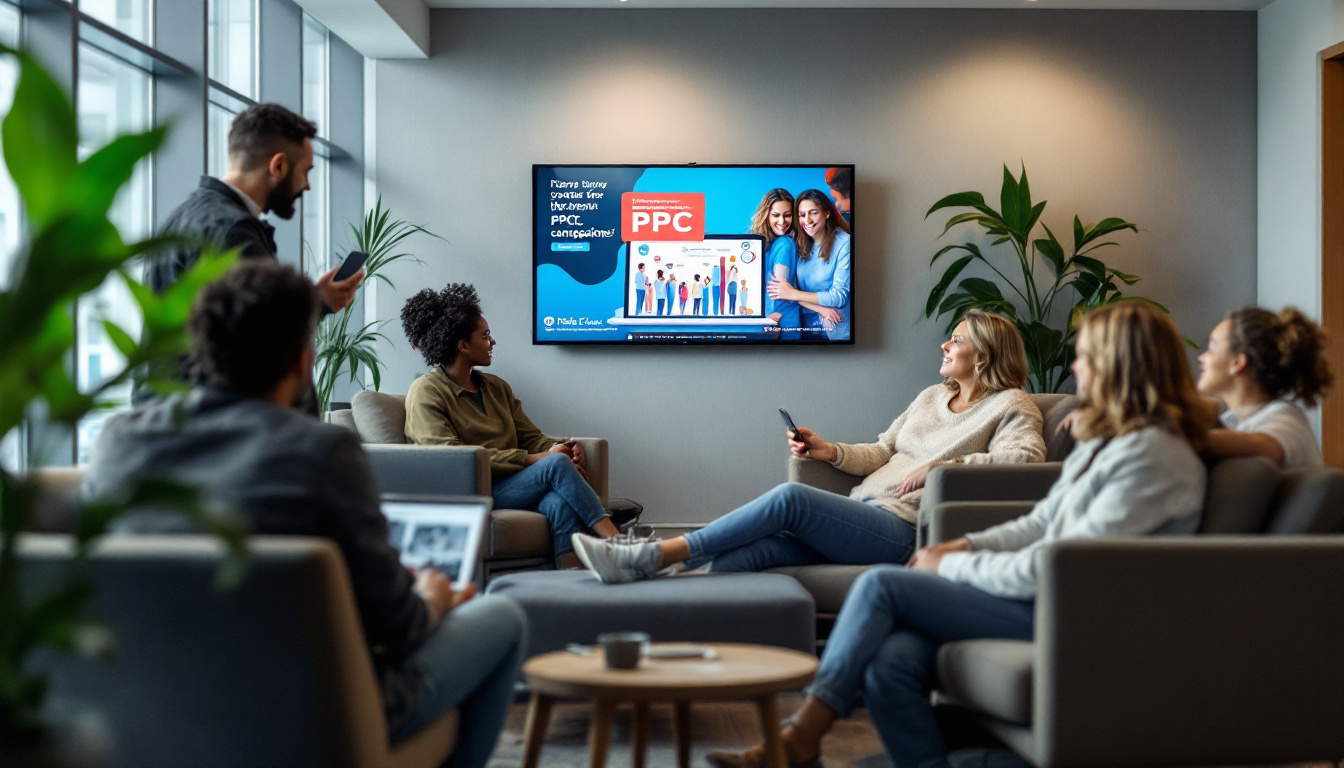How PPC Can Help Chicago, IL Nonprofits Reach Their Goals

In today’s digital landscape, nonprofits in Chicago, IL, are continually seeking innovative strategies to maximize their outreach and impact. One powerful tool that has emerged in this quest is Pay-Per-Click (PPC) advertising. By strategically leveraging PPC, nonprofits can connect more effectively with their target audiences, enhancing their fundraising efforts and community engagement.
Why PPC is a powerful tool for nonprofits in Chicago, IL
PPC advertising holds a unique position in the marketing strategies of nonprofits for several reasons. It offers immediate visibility on search engines and social media platforms, which is crucial for organizations operating on limited budgets and timelines. In a city as vibrant and diverse as Chicago, this immediacy can be the difference between a potential donor finding your organization or overlooking it entirely.
Furthermore, PPC campaigns can be tailored specifically to target demographics, enabling nonprofits to reach individuals most likely to support their missions. In bustling cities like Chicago, where the competition for attention is fierce, standing out through paid search ads can lead to significant advantages. For instance, by focusing on specific neighborhoods or community interests, nonprofits can create highly relevant ads that resonate with local residents, driving both engagement and support.
Additionally, PPC provides measurable results. Nonprofits can track which ads are performing well, providing insight into donor behaviors and preferences. This data-driven approach allows for continuous optimization of campaigns, ensuring funds are used effectively. By analyzing metrics such as click-through rates, conversion rates, and user engagement, organizations can refine their messaging and targeting strategies to better align with their audience's interests.
Understanding the local context
Nonprofits in Chicago can benefit from understanding local search trends and community needs. By tailoring PPC campaigns to the specific interests and challenges faced by Chicago residents, organizations can drive engagement more effectively. This could involve highlighting local events, partnerships with community leaders, or addressing pressing social issues that resonate with the city's diverse population.
For example, integrating local keywords and seasonal trends in campaigns ensures that nonprofits resonate with people in their community. This local focus not only boosts awareness but also fosters a sense of solidarity with potential supporters. By showcasing stories of local impact or featuring testimonials from community members, nonprofits can create a compelling narrative that encourages donations and volunteerism.
Cost-effectiveness of PPC
One of the most attractive aspects of PPC for nonprofits is its cost-effectiveness. With careful budget management, organizations can maximize their return on investment. A well-planned PPC campaign can yield significant traffic and footfall for much less than traditional marketing methods. Moreover, the ability to set daily budgets and adjust bids based on performance allows nonprofits to maintain control over their spending while still achieving their outreach goals.
Furthermore, Google offers grants specifically for nonprofits, allowing organizations to utilize PPC without incurring heavy costs. This opportunity opens up avenues for increased visibility and outreach, further enhancing the nonprofit’s impact. By leveraging these grants, nonprofits can experiment with different ad formats, such as video ads or display ads, to engage their audience in new and innovative ways. This flexibility not only enhances brand awareness but also cultivates a deeper connection with the community, ultimately driving long-term support and engagement.
Setting goals for nonprofit PPC campaigns
Like any marketing strategy, having clearly defined goals is crucial for successful PPC campaigns. Nonprofits should begin by identifying their primary objectives, whether it is raising awareness, increasing donations, or driving event participation.

Once goals are established, organizations can employ SMART criteria (Specific, Measurable, Achievable, Relevant, Time-bound) to ensure their objectives are realistic and actionable. This structured approach not only provides direction but also makes it easier to measure success as campaigns unfold. By regularly reviewing these metrics, nonprofits can pivot their strategies as needed, optimizing their campaigns for better performance and ensuring they are making the most of their advertising budget.
Examples of effective goals
For instance, a nonprofit's goal might be to increase newsletter sign-ups by 30% over three months. This specific target allows for the formulation of relevant ads geared toward collecting email addresses. Additionally, incorporating compelling calls-to-action and offering incentives, such as exclusive content or downloadable resources, can further motivate potential subscribers to engage with the organization.
- Increase online donations by 25% within 6 months.
- Enhance community event attendance by driving traffic to the event registration page.
- Grow social media followers by promoting content that resonates with community interests.
Aligning goals with mission
It is essential that the goals set for PPC campaigns align with the broader mission of the nonprofit. This alignment ensures that all efforts contribute to the organization’s overall strategy, fostering a cohesive approach to outreach and engagement. For example, if a nonprofit is dedicated to environmental conservation, their PPC campaigns should not only aim to raise funds but also educate the public about sustainability practices, thereby reinforcing their mission through every ad.
Moreover, by communicating the mission clearly in PPC ads, nonprofits can attract supporters who share similar values, establishing long-term relationships with their donor base. By showcasing real stories of impact and testimonials from beneficiaries, organizations can create a deeper emotional connection with potential donors, encouraging them to contribute not just financially but also through advocacy and volunteering. This holistic approach to goal-setting and mission alignment can significantly enhance the effectiveness of PPC campaigns, leading to a more engaged and committed supporter community.
How to use Google Ad Grants effectively
Google Ad Grants provide an invaluable resource for nonprofits, enabling them to run PPC campaigns with a significant budget of up to $10,000 per month. However, to make the most of this opportunity, organizations must adhere to specific guidelines and best practices.

Firstly, nonprofits should focus on creating high-quality ads that connect with users' search intents. By researching keywords that potential supporters might use, organizations can align their ads accordingly, ensuring relevance and increased click-through rates. Utilizing tools like Google Keyword Planner can help in identifying trending keywords and phrases that resonate with the target audience, allowing nonprofits to tailor their messaging effectively. Additionally, incorporating location-based keywords can enhance local visibility, drawing in community support and engagement.
Ad optimization strategies
To optimize their campaigns, nonprofits should regularly conduct A/B testing on various ad formats and calls-to-action. This testing can reveal which messages resonate most effectively with audiences and can help refine future ads accordingly. By experimenting with different headlines, descriptions, and display URLs, organizations can gather valuable insights into user preferences. Moreover, leveraging ad extensions, such as site links or callouts, can provide additional information and encourage users to engage further with the organization’s website.
Furthermore, maintaining a well-organized account structure by separating campaigns based on specific goals or audiences can increase efficiency, allowing for precise analysis of performance metrics. This structured approach not only simplifies management but also facilitates targeted messaging, ensuring that each campaign speaks directly to its intended audience. Regularly reviewing and adjusting bids based on performance can also optimize ad spend, ensuring that every dollar is utilized effectively to maximize outreach.
Staying compliant
It's important for nonprofits to stay informed about Google Ad Grant compliance policies to avoid any penalties or account suspensions. Regularly reviewing campaign performance and ensuring active engagement with the ads is crucial for maintaining eligibility. Nonprofits should also be aware of the requirement to maintain a minimum click-through rate (CTR) of 5% and ensure that their ads link to relevant, informative landing pages that provide value to users. Keeping abreast of any changes to Google’s policies is essential, as these can impact how organizations manage their campaigns and maintain their grant status.
Additionally, nonprofits should consider utilizing Google Analytics in conjunction with their Ad Grants to track user behavior and engagement on their websites. By analyzing metrics such as bounce rates and session durations, organizations can gain deeper insights into how visitors interact with their content. This data can inform future campaigns, helping to refine messaging and improve overall effectiveness. Engaging with the Google for Nonprofits community can also provide valuable resources and support, fostering a collaborative environment where organizations can share best practices and learn from one another's experiences.
Tips for crafting emotionally compelling ad copy
Creating ad copy that resonates emotionally with potential supporters can significantly enhance the effectiveness of PPC campaigns. Nonprofits should focus on storytelling, highlighting the impact of donations and support.
A good ad should evoke feelings of empathy and action. Use real stories from beneficiaries or testimonials that showcase the positive changes resulting from the nonprofit's work, making it clear how contributions can make a difference.
Call-to-action strategies
Employing strong calls-to-action (CTAs) is also critical. Whether it's "Donate Now" or "Join Our Cause," CTAs should be direct and inspiring. They must encourage users to take immediate action, reinforcing the urgency of the message.
Moreover, using visually appealing layouts that attract attention without being overwhelming is essential. Combining visuals with strong headlines creates a balanced and compelling advertising message.
Audience engagement
Engaging with audiences on social media or via email can complement PPC efforts effectively. By encouraging conversation around campaign themes, nonprofits can create a community that is more likely to support their initiatives.
Measuring the impact of PPC on nonprofit initiatives
Measuring the effectiveness of PPC campaigns is vital for nonprofits to understand their impact and adjust strategies accordingly. This includes tracking metrics such as click-through rates (CTR), conversion rates, and return on investment (ROI).
Utilizing tools like Google Analytics can help nonprofits monitor their website traffic generated from PPC efforts, providing insights into user behavior and the ultimate outcome of campaigns.
Regular reporting and adjustments
Creating regular reporting schedules allows nonprofits to review campaign performance critically. By identifying what works and what doesn't, organizations can make data-driven adjustments that enhance overall effectiveness.
Ultimately, the goal is to create a sustainable cycle of learning and improving, where each campaign builds upon the successes and lessons of the previous ones.
In conclusion, PPC advertising presents a significant opportunity for nonprofits in Chicago, IL, to reach their goals effectively. By understanding the power of PPC, setting clear objectives, utilizing resources like Google Ad Grants, crafting compelling ad copy, and measuring their impact, organizations can greatly enhance their outreach efforts and further their mission in the community.

As a Google Ads expert, I bring proven expertise in optimizing advertising campaigns to maximize ROI.
I specialize in sharing advanced strategies and targeted tips to refine Google Ads campaign management.
Committed to staying ahead of the latest trends and algorithms, I ensure that my clients receive cutting-edge solutions.
My passion for digital marketing and my ability to interpret data for strategic insights enable me to offer high-level consulting that aims to exceed expectations.















